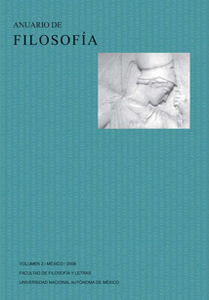Creación continua y tiempo en la filosofía natural de René Descartes
Main Article Content
Abstract
Much has been written on Cartesian dualism and its consequences. In contrast, very little has been said on the notion of time. Descartes himself scarcely mentioned it. In this paper I intend to reconstruct the Cartesian conception of time in the context of its metaphysical foundations. Time is a physical notion, immersed in several senses in Cartesian metaphysics. On the one hand, the metaphysical roots of time are buried in the notion of creation or continuous preservation. Their main role is to explain the conservation of the quantity of motion expressed in the Cartesian physical laws. For the French philosopher, how the extended substance in motion is permanently preserved must be explained. Simultaneously, in the plenum, particular bodies in motion transmit and lose motion continuously. On the other hand, it is relevant to make clear if Descartes’ conception on time and duration depend on motion or, on the contrary, if time is independent of motion. For this purpose, I propose that it is necessary to stick to a radical interpretation of Cartesian metaphysical dualism in order to understand why: 1) in ontological terms, duration and motion are inseparable attributes of extended things and 2) in epistemic terms, time is a mode of human thought meant to know the duration of material things, with the inclusion of parameters and conventions.
Article Details
How to Cite
Monroy Nasr, Z. (2012). Creación continua y tiempo en la filosofía natural de René Descartes. Anuario De Filosofía, 2. Retrieved from https://revistas.unam.mx/index.php/afil/article/view/31548
